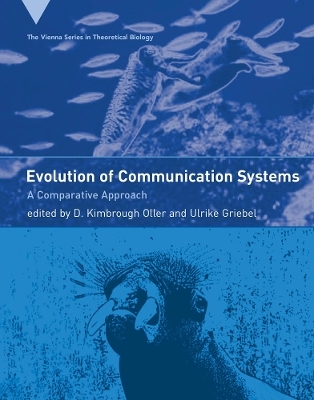
Evolution of Communication Systems
A Comparative Approach
Seiten
2004
Bradford Books (Verlag)
978-0-262-15111-5 (ISBN)
Bradford Books (Verlag)
978-0-262-15111-5 (ISBN)
- Titel ist leider vergriffen;
keine Neuauflage - Artikel merken
Laying foundations for an interdisciplinary approach to the study of evolution in communication systems with tools from evolutionary biology, linguistics, animal behavior, developmental psychology, philosophy, cognitive sciences, robotics, and neural network modeling.
The search for origins of communication in a wide variety of species including humans is rapidly becoming a thoroughly interdisciplinary enterprise. In this volume, scientists engaged in the fields of evolutionary biology, linguistics, animal behavior, developmental psychology, philosophy, the cognitive sciences, robotics, and neural network modeling come together to explore a comparative approach to the evolution of communication systems. The comparisons range from parrot talk to squid skin displays, from human language to Aibo the robot dog's language learning, and from monkey babbling to the newborn human infant cry. The authors explore the mysterious circumstances surrounding the emergence of human language, which they propose to be intricately connected with drastic changes in human lifestyle. While it is not yet clear what the physical environmental circumstances were that fostered social changes in the hominid line, the volume offers converging evidence and theory from several lines of research suggesting that language depended upon the restructuring of ancient human social groups. The volume also offers new theoretical treatments of both primitive communication systems and human language, providing new perspectives on how to recognize both their similarities and their differences. Explorations of new technologies in robotics, neural network modeling and pattern recognition offer many opportunities to simulate and evaluate theoretical proposals. The North American and European scientists who have contributed to this volume represent a vanguard of thinking about how humanity came to have the capacity for language and how nonhumans provide a background of remarkable capabilities that help clarify the foundations of speech.
The search for origins of communication in a wide variety of species including humans is rapidly becoming a thoroughly interdisciplinary enterprise. In this volume, scientists engaged in the fields of evolutionary biology, linguistics, animal behavior, developmental psychology, philosophy, the cognitive sciences, robotics, and neural network modeling come together to explore a comparative approach to the evolution of communication systems. The comparisons range from parrot talk to squid skin displays, from human language to Aibo the robot dog's language learning, and from monkey babbling to the newborn human infant cry. The authors explore the mysterious circumstances surrounding the emergence of human language, which they propose to be intricately connected with drastic changes in human lifestyle. While it is not yet clear what the physical environmental circumstances were that fostered social changes in the hominid line, the volume offers converging evidence and theory from several lines of research suggesting that language depended upon the restructuring of ancient human social groups. The volume also offers new theoretical treatments of both primitive communication systems and human language, providing new perspectives on how to recognize both their similarities and their differences. Explorations of new technologies in robotics, neural network modeling and pattern recognition offer many opportunities to simulate and evaluate theoretical proposals. The North American and European scientists who have contributed to this volume represent a vanguard of thinking about how humanity came to have the capacity for language and how nonhumans provide a background of remarkable capabilities that help clarify the foundations of speech.
D. Kimbrough Oller is Professor and Plough Chair of Excellence in the School of Audiology and Speech-Language Pathology at the University of Memphis and an external faculty member of the Konrad Lorenz Institute for Evolution and Cognition Research, Altenberg, Austria. He is coeditor, with Ulrike Griebel, of Evolution of Communications Systems: A Comparative Approach (MIT Press, 2004).
| Reihe/Serie | Vienna Series in Theoretical Biology |
|---|---|
| Zusatzinfo | 36 illus.; 36 Illustrations, unspecified |
| Verlagsort | Massachusetts |
| Sprache | englisch |
| Maße | 178 x 229 mm |
| Gewicht | 726 g |
| Themenwelt | Naturwissenschaften ► Biologie ► Evolution |
| Naturwissenschaften ► Biologie ► Zoologie | |
| ISBN-10 | 0-262-15111-1 / 0262151111 |
| ISBN-13 | 978-0-262-15111-5 / 9780262151115 |
| Zustand | Neuware |
| Haben Sie eine Frage zum Produkt? |
Mehr entdecken
aus dem Bereich
aus dem Bereich
Wie die Vernichtung der Arten unser Überleben bedroht - Der …
Buch | Softcover (2023)
Penguin (Verlag)
CHF 20,95


